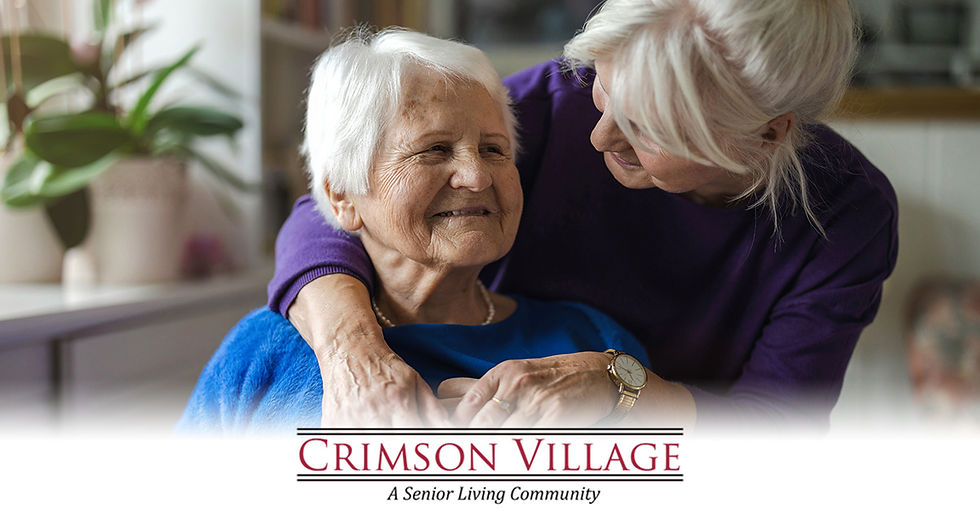Navigating the emotional rollercoaster of dementia
- Crimson Village
- Mar 28, 2024
- 3 min read

The diagnosis of dementia for a parent or loved one, devastating as it is for the patient, can also mark of a challenging time for family and friends. Anticipatory grief, or grief that precedes a great loss, is a common initial reaction to the long goodbye that lies ahead as the disease slowly robs a person of their memory and independence.
The daily ups and downs of dementia can be an additional stressor on everyone involved. The journey will likely include both good days and bad days, even as the disease continues to progress. People or events may trigger happy memories on some occasions, while other days make strangers of children and grandchildren.
While there is currently no cure for dementia – or Alzheimer’s, a specific type of dementia – there are things you and your loved one can do to help make good days more frequent, ensure they are safe and well cared for, and help you maintain the strength and support you need during this phase of life.
Educate yourself
Learn as much as you can about Alzheimer’s disease and related dementias so you and your family will know what to expect. Seek out support organizations to find others who share your situation or have experienced it before, as well as a safe place to share your thoughts and feelings. Understanding the nature of dementia and its progression may help foster empathy and aid in coping with the emotional changes you’re experiencing.
Communicate simply
Sharing a conversation with a loved one who has dementia may be challenging, so senior memory support experts suggest using simple and clear language, speaking slowly, and maintaining eye contact. By allowing your loved one sufficient time to process information and respond, they are better able to respond and feel included. Remind the individual that you care about them and be patient and compassionate when interacting with them.
Establish routines
Consistency and predictability can help reduce anxiety and emotional distress among seniors with dementia. This includes establishing daily routines for mealtimes, activities, and sleep to provide a sense of stability and comfort. You might also consider having the same meals and activities on the same day of the week. Patients will also benefit from a peaceful and structured environment that reduces stress, anxiety, and confusion. Minimize noise, keep physical clutter at bay, and avoid overwhelming stimuli.
Encourage activity
As is true for all of us, regular physical activity can help reduce restlessness and promote a sense of well-being. Activities like walking, gentle stretching, or chair exercises, depending on their abilities, are great additions to a daily routine. As part of a daily routine, you might also encourage your loved one to continue activities they’ve enjoyed in the past, such as listening to music, looking at photo albums, doing puzzles, or participating in simple crafts.
Practice self-care
This can feel selfish, but remember to prioritize your own well-being. “Filling your own cup” by participating in enjoyable activities on your own will leave you better able to support your loved one when you’re together. Take time to be with friends or other family members, spend time alone when you need it, and be sure to take a day off when you need one. It’s important to treat yourself with the same compassion and understanding you extend to others.
Consider a change in living arrangements
If your loved one is living with dementia and relying on family for support and assistance, it may be time to consider transitioning to more specialized care for patients with dementia. By taking advantage of the specialized care available at Crimson Village, you can provide an environment especially suited for seniors with dementia while regaining your own role as a beloved family member or friend rather than caregiver.
Learn more about the memory care available at Crimson Village by clicking here or contacting our helpful team members by email at marketing@crimsonvillage.com or by phone at 205-632-6699 to discuss your specific needs.




